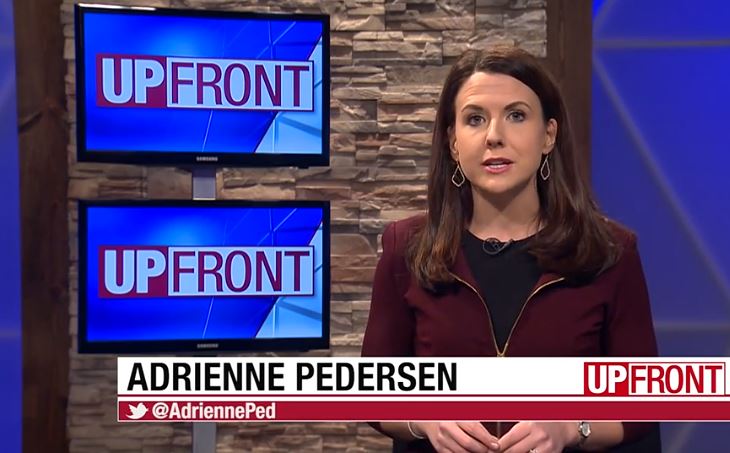The head of a conservative legal group says the U.S. Supreme Court’s ruling on the state’s legislative maps ought to change the mind of Wisconsin Supreme Court Justice Brian Hagedorn.
“It has to, right?” Rick Esenberg, president of the Wisconsin Institute for Law and Liberty, said on WISN’s “UpFront,” produced in partnership with WisPolitics.com. “On federal law, the United States Supreme Court has the last word, and what happened here is Justice Hagedorn thought federal law compelled him to do what he did. The United States Supreme Court said it did not. In fact, it could very well prohibit him from doing what he did.”
Hagedorn, who was elected in 2019 with the backing of Republicans, sided with the court’s liberals in choosing maps drawn by Democratic Gov. Tony Evers.
In its order, the U.S. Supreme Court sent the issue back to the state court after determining justices had not carefully reviewed whether Evers’ maps comply with the federal Voting Rights Act.
“The conventional wisdom is it will come down to Justice Hagedorn,” Esenberg said. “There are three justices who I think were ready to probably select the legislative maps. Justice Hagedorn did not do that.”
Republicans are asking the state court to implement the Republican-drawn maps, a move that would likely prompt additional court action.
“I do think it would be appealed by parties,” said Sachin Chheda, director of the Fair Elections Project. “I think you have to remember that map has been rejected three times already.”
Evers is asking the court to take additional testimony. The court could also keep in place the current legislative maps for the upcoming election cycle.
“I think that’s really hard to do because we know those maps are totally unconstitutional because of population equity issues,” Chheda said. “So I think it’s very, very hard for them to do that. I think if they tried to do that, that would also get taken to federal court and cause more chaos in the system.”
The WIAA says it won’t push to change national rules involving video review of high school athletics after it was sued by the St. Thomas More boys’ basketball team in Milwaukee.
“It’s troubling,” said Stephanie Hauser, executive director of the WIAA. “At a time when we want the focus to be on the tournament series and just the positivity of what high school sports is all about, it was certainly a distraction for many.”
A fight, which was captured on video, resulted in officials ejecting every player on the team for leaving the bench, a national federation rule.
The decision initially ended the team’s playoff run.
But the team sued, and a Milwaukee County judge reversed the call and decision by the WIAA to back the officials’ decision, allowing the team to continue playing.
St. Thomas More and its attorneys argued the WIAA didn’t review video of the incident and only took the officials’ report, which is another aspect of national federation guidelines.
“We are facing a crisis of an officials shortage,” Hauser said. “We are really in crisis mode. High school athletes can’t happen without them. By using video review to continually dig deeper into their decisions, it sends a message to them. It puts them into question, and at a time when we’re begging them to come back to stay with us, that’s a difficult sell.”
Greg Marcus, president and CEO of the Milwaukee-based Marcus Corporation, said there’s still a long road ahead for movie theaters to fully recover from the pandemic.
“It is coming back,” Marcus said. “Am I comfortable where it is? No, because I want it to keep getting better. I think people expect things to turn around like this, and it’s a multi-year road back for us.”
Marcus oversees the fourth-largest theater group in the country, with 85 theaters in 17 states.
“The other challenge we have is just getting movies made,” Marcus said. “The pandemic just didn’t affect people going to do things, it affected the actual production of movies. And one of the studios moved a bunch of release dates recently, and it’s because they just can’t get things finished. The post-production houses, I’ve been told, are just jammed up.”
Marcus said the company is continually evolving to enhance the moving-going experience. The company’s latest report to investors this past month noted it has invested some $580 million in the past decade to modernize the experience.
“We are in a battle against the couch,” Marcus said. “That is our biggest competition.”
Marcus also noted the ongoing conversations with movie studios and lobbying to ensure movie theaters get the first release before streaming services, a move that gained popularity during the pandemic.
“When you come to a theater, obviously the price of a ticket is more expensive,” Marcus said. “Well the studios get a huge chunk of that, and so for them if they give up a chunk of revenue, they then have to make it up in streaming, and I’m not so sure the economics actually support that.”
Watch the program here.



